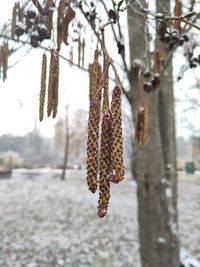Pollen information for Vienna from 16 February 2026
Changeable weather makes for fluctuating pollen count!
At the beginning of the week, snow and rain are still creating conditions that allow little to no pollen count. However, the brief improvement in the weather on Wednesday may lead to a rapid increase in the expected pollen count before another bad weather front provides relief. The weather is then expected to improve again towards the weekend, leading to an increase in exposure.
If the temperatures in Vienna rise to 5 °C or more in the coming days and dry conditions prevail, moderate pollution from the flowering of tree and shrub hazel is to be expected. In the event of precipitation, only low levels of contamination are to be expected locally. The plants are often found in parks or gardens, and in the case of the common hazel also on forest edges.
Alders can also cause more intensive pollution under suitable conditions. The grey alder is primarily responsible for this, as it replaces the purple alder, which has already largely finished flowering, and usually begins to flower somewhat earlier than the black alder. Locally, i.e. predominantly in riparian forests or near bodies of water, intensive blooms can also occur if the weather is favourable. However, only low to moderate pollen concentrations in the air are to be expected across the board in the coming days.
In addition to the pollen types mentioned above, the following are also represented in the pollen spectrum: Cypress plants. However, they only have a very low potential to cause allergic reactions.
Flowering alder/hazel | on the |
Vienna city centre | ready to flower |
Vienna/Hohe Warte | 2026-02-22 |
Vienna/Schwechat-Airport | 2026-02-23 |
Vienna/Unterlaa | 2026-02-22 |
Forecast date: 2026-02-18
Note: The data shown here are model data for the expected start of flowering. For more detailed information on the expected pollen count, please refer to the text forecasts.
Responsible for the content
AZ Pollenresearch GmbH
im Auftrag des Vereins Österreichischer Polleninformationsdienst in Kooperation mit der GeoSphere Austria.
Dr. med. Markus Berger, Dr. rer. nat. Johannes M. Bouchal und Lukas Dirr, MSc.
Wetterdaten und Prognosen basierend auf synoptischen Daten:
GeoSphere Austria, Bundesanstalt für Geologie, Geophysik, Klimatologie und Meteorologie (ehemals ZAMG).
zum Team


